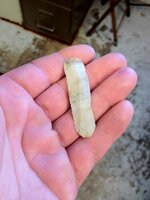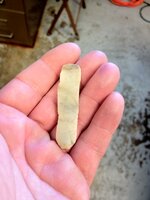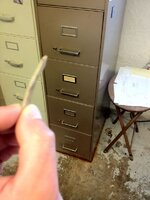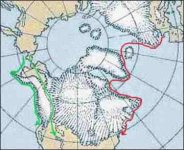Navigation
Install the app
How to install the app on iOS
Follow along with the video below to see how to install our site as a web app on your home screen.
Note: This feature may not be available in some browsers.
More options
You are using an out of date browser. It may not display this or other websites correctly.
You should upgrade or use an alternative browser.
You should upgrade or use an alternative browser.
I think this is old!!
- Thread starter NC field hunter
- Start date
NC field hunter
Silver Member
- Jul 29, 2012
- 4,227
- 1,624
- Thread starter
- #3
Twitch said:It's a bladelet or a flake blade. Assuming it was found in context it's a nice example. I primarily see them in Woodland sites but I'm sure they show up in other strata as well. Cool find.
Joe
Woodland! I was thinking older, but woodland sounds good to me! I have been on a quest to find pottery in my home town, but can't. All of my sites seem too primitive . Along with this piece, I found what looked like a small pot chard. I was too embarrassed to post it, that is how small it is. This was only my second 15 minute trip to this site. The strange point I posted came from there as well. I'll have more time in the morning to look that place over. I hope woodland is right. Thanks for viewing!
Harry Pristis
Bronze Member
Found this on lunch today! I am pretty sure it is really old! What do y'all think?
This sort of flake blade has to be in the running for the "universal tool."
"Blade tool definition:
1. twice as long as wide with blade margins fairly parallel.
2. two or more longitudinal crests or ridges indicating other flakes were removed from the core in the same direction.
Blades are the hallmark of the European Upper Paleolithic period and have antecedents in the Mousterian and perhaps even the late Acheulean periods. Many of the tools made on blades decribed for the European Upper Paleolithic are found also at sites in North America." ....B. Purdy, FLORIDA'S PREHISTORIC STONE TECHNOLOGY
NC field hunter
Silver Member
- Jul 29, 2012
- 4,227
- 1,624
- Thread starter
- #5
Harry Pristis said:This sort of flake blade has to be in the running for the "universal tool."
"Blade tool definition:
1. twice as long as wide with blade margins fairly parallel.
2. two or more longitudinal crests or ridges indicating other flakes were removed from the core in the same direction.
Blades are the hallmark of the European Upper Paleolithic period and have antecedents in the Mousterian and perhaps even the late Acheulean periods. Many of the tools made on blades decribed for the European Upper Paleolithic are found also at sites in North America." ....B. Purdy, FLORIDA'S PREHISTORIC STONE TECHNOLOGY
Thank you Harry. You are backing my original thought. I thought paleo, but was happy to hear woodland because I want to find some Person Co. Pottery. I have read that these were used in all times. I really could not say with 100% certainty ! Thanks Harry. Always good to hear your point of view. Now Gator's turn. Lol! Just messin with ya Harry.
- Jan 27, 2009
- 18,725
- 11,731
- 🥇 Banner finds
- 1
- Detector(s) used
- Tesoro Conquistador freq shift
Fisher F75
Garrett AT-Pro
Garet carrot
Neodymium magnets
5' Probe
- Primary Interest:
- All Treasure Hunting
Nice!!!!!!!! They made that tool in every time frame. Good addition to your collection.
GatorBoy
Gold Member
- May 28, 2012
- 14,716
- 6,149
- Primary Interest:
- All Treasure Hunting
- Jan 27, 2009
- 18,725
- 11,731
- 🥇 Banner finds
- 1
- Detector(s) used
- Tesoro Conquistador freq shift
Fisher F75
Garrett AT-Pro
Garet carrot
Neodymium magnets
5' Probe
- Primary Interest:
- All Treasure Hunting
The
Solutreans make sense to me as technology seems to have come from the east. More clovis finds in the south east than anywhere else,,,, 20,000 verses 12,000 old. I vote 20,000 as the evidence is leaning that way. Hot topic that one.
Last edited:
Gunrunner61
Silver Member
- Jan 12, 2011
- 2,963
- 457
- Detector(s) used
- Whites MXT, E Trac, Garrett Pro Pinpointer
- Primary Interest:
- All Treasure Hunting
TheSolutreans make sense to me as technology seems to have come from the east. More clovis finds in the south east than anywhere else,,,, 20,000 verses 12,000 old. I vote 20,000 as the evidence is leaning that way. Hot topic that one.
I'm with you on that! no doubt about it...............HH
old digger
Gold Member
- Jan 15, 2012
- 7,507
- 7,333
- Detector(s) used
- White's MXT
- Primary Interest:
- All Treasure Hunting
To stay on the subject; That is really nice flake knife that you have found.  The age usually boils down to what stratum it was found in, or point types it is found with.
The age usually boils down to what stratum it was found in, or point types it is found with.
NC field hunter
Silver Member
- Jul 29, 2012
- 4,227
- 1,624
- Thread starter
- #12
old digger said:To stay on the subject; That is really nice flake knife that you have found.The age usually boils down to what stratum it was found in, or point types it is found with.
I'm with you there. I really hope that I have a woodland site! We will see what I come out with tomorrow!
justonemore
Sr. Member
Look up Lamellar blade,very typical of mound culture, Hopewell etc. Good chance of finding pottery on that site.
I think I missed on this one. I have to agree with justonemore. I guess I can blame my earlier post on it being just to early in the morning for artifact ID! It still is an excellent artifact. It's just not every day you see that kind of quality in later lithics.
N
natchitoches
Guest
Paleoindian & Other Archaeological Stuff
this web site thinks that both ways happen. the big body clovis came down from the northwest and the Solutreans down from the northeast.
the Folsom came from the Solutreans .read more about it here.
really a great read
this web site thinks that both ways happen. the big body clovis came down from the northwest and the Solutreans down from the northeast.
the Folsom came from the Solutreans .read more about it here.
really a great read
N
natchitoches
Guest
GatorBoy
Gold Member
- May 28, 2012
- 14,716
- 6,149
- Primary Interest:
- All Treasure Hunting
I'm interested in what makes you think that. About the quality of later lithics being somehow lesser.mcb66 said:I think I missed on this one. I have to agree with justonemore. I guess I can blame my earlier post on it being just to early in the morning for artifact ID! It still is an excellent artifact. It's just not every day you see that kind of quality in later lithics.
Last edited:
Look at the Paleo stuff;almost always fine grain, high quality material. Core stones from known quarries were traded all over place. Most Paleo points you see can be traced back to known quarries simply by the quality and type of the material. Try doing that with a standard middle woodland point. It's almost impossible. Not that there aren't some jewels out there. It's just that later people tended to use what was available and not care so much about materials, grain size, etc.. NC field finders blade is not patinated and was created with only 4 strikes, every strike being intentional and exact. Not unlike a Clovis or Folsom point. It is a high quality piece. My point of view is based upon location also. I haven't evaluated many artifacts from areas other than the southeastern U.S. Rules may be different elsewhere.
Michael
Michael
Top Member Reactions
-
 1939
1939 -
 1060
1060 -
 1023
1023 -
 999
999 -
 868
868 -
 863
863 -
 862
862 -
 745
745 -
 707
707 -
 590
590 -
 394
394 -
 364
364 -
 358
358 -
 351
351 -
 345
345 -
E
339
-
 333
333 -
 323
323 -
 299
299 -
 289
289
Users who are viewing this thread
Total: 2 (members: 0, guests: 2)










